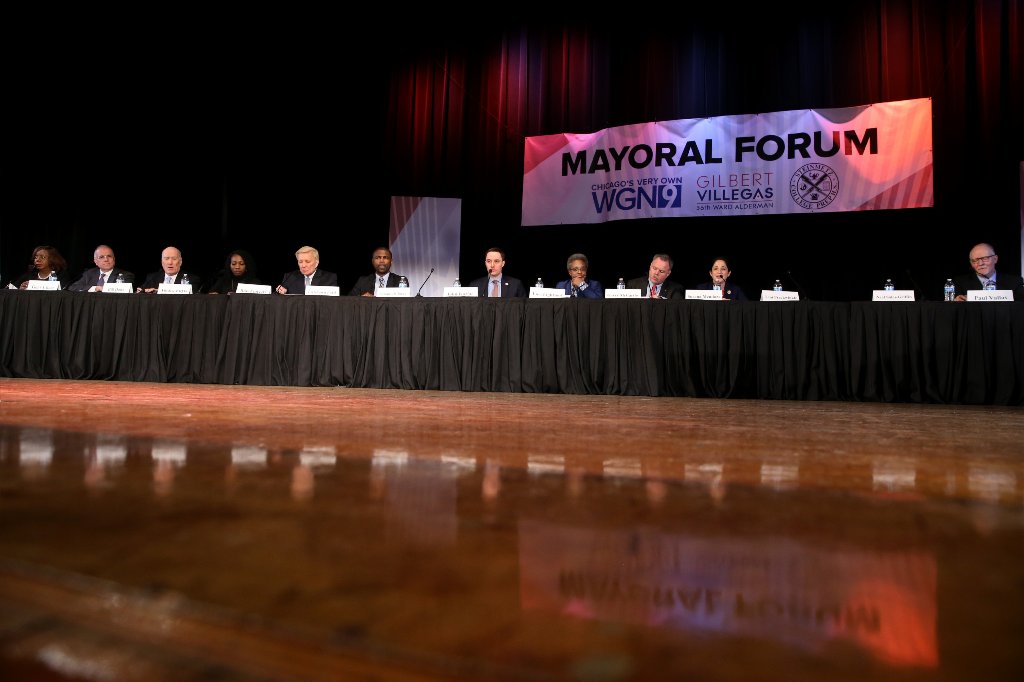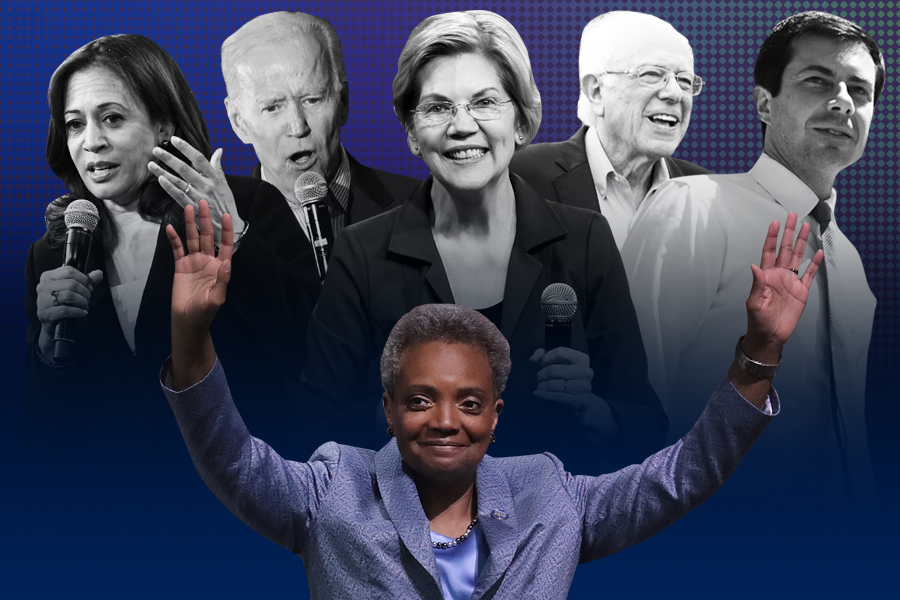The Democrats running for president can learn a lot from Chicago's 2019 mayoral election.
After all, both races share a double-digit field of candidates (14 for Chicago mayor, 23 for the Democratic nomination). Both involve names that have been in politics for decades (Bill Daley and Toni Preckwinkle in Chicago, Joe Biden and Bernie Sanders nationally). And both have candidates with no chance of winning, or who are just in it for the publicity (Willie Wilson and Andrew Yang respectively — sorry, guys).
More broadly, as a diverse city with a strong progressive constituency, Chicago is a microcosm of the Democratic electorate. According to recent census projections, the city is about one-third black, one-third Latinx, and one-third white (non-Hispanic, non-Latinx). Additionally, we're famously divided between high-earning professionals and the working class — the two constituencies at the opposite economic ends of the Democratic coalition.
So what lessons can the presidential candidates draw from our mayoral candidates? Here are a few.
Name recognition isn't a deal-breaker (and could be a disadvantage)
A year ago, 95 percent of Chicagoans could not have put a face to the name “Lori Lightfoot.” Today, she's the mayor.
Lightfoot turned her lack of political experience into a winning message. Recall, after Ald. Ed Burke was indicted for extortion, that Lightfoot ran an ad attacking four of her better-known opponents — Toni Preckwinkle, Bill Daley, Susana Mendoza, and Gery Chico — for their connections to Burke.
Nationally, the Democratic Party does best with nominees who come out of left field. The party’s last three winners — Jimmy Carter, Bill Clinton, and Barack Obama — were nationwide obscurities for years before announcing their candidacies for president.
Don’t run to continue a predecessor’s legacy
At her campaign kickoff, Toni Preckwinkle tried to present herself as the candidate who would pick up where Harold Washington left off. Meanwhile, Bill Daley appeared as the heir to two mayors from his own family, his brother and father.
As a former investment banker, Daley was also seen as the man who would carry on Rahm Emanuel’s policies of promoting downtown business development. Crain’s Chicago Business and the Tribune loved him.
Similarly, Joe Biden shouldn’t run to serve Barack Obama’s third term. Democrats who have run as a successor to a previous administration — Hubert Humphrey, Walter Mondale, Al Gore, Hillary Clinton — have invariably lost. We loved Obama, but it’s time for someone new.
Don’t invite every candidate to every debate
Remember the mayoral debate at Steinmetz High School? Twelve candidates sat on the stage (13 when Jerry Joyce showed up). They all got two minutes to introduce themselves, and less time to answer every question. We didn’t learn much about what they stood for.

Photo: Chicago Tribune
Fox 32’s Mike Flannery, on the other hand, did debates right, holding a series of forums limited to five candidates apiece.
Lightfoot wasn’t invited to the first debate, which was reserved for candidates then seen as serious contenders. It didn’t matter. What mattered was that she had plenty of time to present her message of reform during Flannery’s second debate.
The first round of Democratic presidential debates — on Wednesday, June 26 and Thursday, June 27 — will feature two ten-candidate fields. The deabtes will likely be unwieldy and favor front-runners; less time per person means less time for little-known candidates to state their cases. In 2016’s 10-candidate Republican debates, everyone had a hard time getting a word in around Trump.
Pick an issue, and hope the voters follow you there
Lightfoot didn’t just jump on the reform issue after Ed Burke was indicted — she’d been there for her entire campaign, even before Emanuel announced he wouldn't seek a third term. Lightfoot's first significant supporter was good government guru Dick Simpson, who helped her write a plan that included ending aldermanic privilege and banning outside employment for aldermen.
When voters decided they wanted a mayor who would end the Chicago Way, Lightfoot had more credibility as a reformer than any other candidate. She may have gotten lucky, but she was prepared to get lucky.
Of the presidential candidates, several have identified themselves with issues that may end up dominating the campaign: Bernie Sanders on income inequality, Jay Inslee on climate change, and Elizabeth Warren on corporate malfeasance.
Build a multi-racial coalition
Identity politics worked for Donald Trump, but he ran as the nominee of an overwhelmingly white party. The Democratic Party is much more racially diverse, and so is Chicago.
In Chicago, several candidates thought they could make it into the runoff by appealing to their ethnic bases: Susana Mendoza to Latinx voters, Willie Wilson to black voters, and Bill Daley to Irish-American voters. They all failed.
The candidates who made the finals were the candidates who most successfully transcended racial categories. Lori Lightfoot and Toni Preckwinkle, both black, had racially varied voter bases — Lightfoot finding her strongest support in white lakefront wards on the North Side and Preckwinkle appealing to middle-class black voters on the South Side and leftist organizers throughout the city.
Likewise, even in a fractured field, presidential candidates are going to have to attract voters from outside their own demographic groups. Barack Obama succeeded in 2008; Bernie Sanders failed to do so in 2016.
The further left, the better
The emotions Trump inspires in both Democrats and Republicans are pulling the parties toward opposite political extremes. Democrats hate him, and so does Chicago.
In Chicago's mayoral race, the three most progressive candidates were Preckwinkle, Lightfoot, and Amara Enyia. Preckwinkle and Lightfoot made the runoff. The “law and order” candidates, Garry McCarthy and Jerry Joyce, finished in the low single digits.
In the presidential campaign, Colorado Gov. John Hickenlooper was booed earlier this month for telling a crowd of California Democrats that “socialism is not the answer.” In 2019, Chicago wasn’t looking for a middle-of-the-road candidate. In 2020, the Democrats may not be, either.



